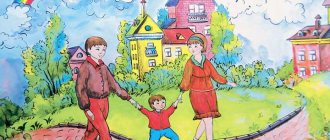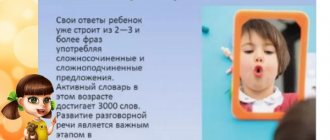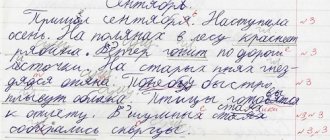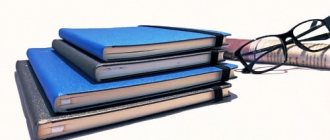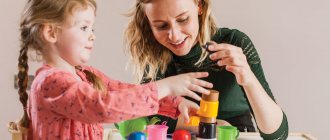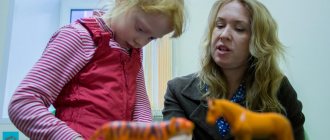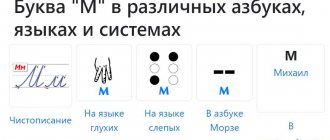Summary of speech therapy holiday with presentation Travel to the country...
aret.ru › …konspekt-logopedicheskogo-prazdnika-s…v…
2.
Speech therapy games for children
logoped 18. ru › logoped ic ... logopedicheskie - play . php
3.
Speech therapist .RU: Speech therapy games .
— LOGOPED.RU logoped .ru › play .htm
4.
Methodological development on speech therapy on the topic: Speech therapy games …
nsportal.ru›Kindergarten›Speech therapy›…/ logopedicheskie — play
Speech therapy week as a means of activating speech activity in children with disabilities
Anna Osipova
Speech therapy week as a means of activating speech activity in children with disabilities
From the experience of (correctional) speech therapist teacher
boarding school Osipova A. G.
Speech is one of the most important mental functions of a person and a complex functional system, which is based on the use of the sign system of language in the process of communication. Speech communication creates the necessary conditions for the development of various forms of activity . A child’s mastery of speech contributes to awareness, planning and regulation of his behavior. It is necessary, from an early and preschool age, to help the child overcome speech disorders, since they negatively affect all mental functions and affect the child’s activities and behavior. Severe speech impairments can affect mental development, especially the formation of higher levels of cognitive activity , which is due to the close relationship between speech and thinking and the limited social and speech contacts , during which the child learns about the surrounding reality.
Today, in the arsenal of everyone involved in raising and teaching children with speech disorders, there is extensive practical material , the use of which contributes to the effective speech development of the child . But we are faced with difficulties in correctional work due to the increased number of speech pathologies . Speech therapists , in addition to traditional methods, present new non-traditional forms of working with children - speech pathologists . According to V. M. Akimenko, any practical material can be divided into two groups: firstly, helping the child’s direct speech development and , secondly, indirect , which includes non-traditional speech therapy technologies .
Working with children with a variety of speech disorders , I encountered problems:
— a long period of automation and differentiation of delivered sounds;
— improve continuity in the work of the speech therapist and teaching staff;
- attracting the activity and interest of parents to the speech development of their children ;
- due to decreased attention and interest in children’s search activities , low performance.
Therefore, holidays occupy a special place in the system of education and training of children with speech disorders. A high emotional upsurge and anticipation of a solemn event sharpen children’s , they better perceive and assimilate the materials of songs and poems. Along with traditional forms of conducting classes, correction also occurs in extracurricular activities . One of the new forms of my work is the annual “ Speech Therapy Week ”
.
Considering various sources of information and literature, I came to the conclusion that there are very few places where you can see and hear about holding such holidays specifically for children with disabilities . Conducting “
Speech Therapy Week ” , where each child is given the opportunity to demonstrate their successes.
Carrying out such activities develops children's sense of confidence and creativity.
Helping a child realize his potential as much as possible and correct existing shortcomings is possible only through intensive, systematic and consistent correctional and developmental work. During the “ Speech Therapy Week ”
a number of problems are solved:
speech therapy classes for students with disabilities ;
— development of cognitive and mental processes;
— creating conditions for the emotional and personal well-being of children ;
— implementation of the relationship in the work of teachers and parents.
speech therapist's work do not always appear as quickly as we would like. However, the similar events that I have repeatedly held show that children have a desire to engage, dynamics in sound pronunciation are evident, and the ability to perform different types of exercises that were previously inaccessible to them. At such events, children become participants in various events from the lives of people, animals, and plants, which gives them a deeper understanding of the world around them. This helps children develop a sense of their native language and the ability to pronounce words correctly, and easily learn its grammatical norms. When you work with children who have speech impairments and intellectual disabilities, it can be very difficult to hold their attention, awaken interest in the content of the lesson, the learning process as a whole, and ensure that the learned material is retained in memory for a long time and used in new conditions.
For the “ Speech Therapy Week ”
I draw up a plan of events for each day.
During the week various events are held for children : competitions, quizzes, entertainment and speech therapy holidays , theatrical activities . All this is agreed upon by the head teacher and is posted for children and teachers in a special corner “Our School Life”
.
During the week , all planned competitions, holidays, open speech therapy classes , and quizzes are held.
Then everything goes according to plan. Plan for the “ Speech Therapy Week ”
Days of the week Direction of work
Monday Opening of speech therapy week . Speech therapy holiday “Journey to the land of correct speech”
.
Tuesday Celebration of the sound “R”
Wednesday Open speech therapy lesson “Automation of the sound “R”
in words and in sentences"
Thursday Speech entertainment “Journey to a Fairy Tale”
Friday Theatrical activity . Fairy tale "Kolobok"
. Summing up and awards.
Every year the weekly changes and improves, which helps to increase interest among children and teachers . As the events progress, various exhibitions of literature and competition materials (drawings, creative works, etc.) are organized.
.
Here there is a close connection between the work of the speech therapist and the library worker and educators. The children themselves must participate
in the preparation, design and conduct of the speech therapy week Here they are given the opportunity for self-realization, manifestation of their abilities and independence. Conducting a speech therapy week activates children and gives them an emotional mood for learning. This non-traditional form of work is important for children and teachers . It promotes the expression of feelings, the opportunity to speak freely and openly, the development of children’s intellectual and artistic abilities, the development of curiosity, team unity, and helps in their further socialization into society.
All children participate in various activities. As a rule, students who have positive developmental dynamics have better results. This is a high indicator of speech therapy correction .
? Report on the resultsSpeech therapy week “Speech Kaleidoscope”
Name of educational organization: MBDOU d/s "Mishutka"
№
p/p
| Name of the events held | The target audience | Number of participants | Main results of the event | Difficulties, problems | Marking availability of offers |
| 14.11.2017 | Drawing up an action plan | Teachers, specialists | 7 | ||
| 15.11.17 | Puppet theater "Masha and the Bear" | Middle group children | 16 | The children's vocabulary was activated, the children willingly participated in the general conversation and discussion. | Not all children were able to answer the questions. |
| Speech therapy quiz “Solve it” | Older children | 22 | Children's cognitive and speech abilities have improved by solving puzzles, riddles, and crosswords. | Children coped with some tasks only if there were leading questions. | |
| Speech warm-up “Hello, friend” | Children of the preparatory group | 25 | — | — | |
| GCD “Nimble fingers, skillful fingers!” | Middle group children | 16 | Children received positive emotions while completing tasks with Marbles pebbles | ||
| Consultation for teachers: “Why do we need articulatory gymnastics?” | Teachers | 5 | Each teacher received a complex of articulation gymnastics | There were difficulties in displaying the art. exercises “Pancake”, “Mushroom”, etc. by the teachers themselves | |
| 16.11.17 | Lesson “Visiting Lesovichka.» (writing a descriptive story) | Middle group children | 17 | They practiced forming adjectives from nouns, agreeing adjectives with nouns; clarified the meaning of the prepositions “on”, “under”, “behind”, “between”, “before” and “about”. | Children have difficulty forming adjectives from nouns and agreeing adjectives with nouns |
| Finger play day | Older children | 21 | During the day, the children learned 5 finger exercises and contributed to the development of children's fine motor skills. | No | |
| We train our fingers - we develop speech | Children of the preparatory group | 26 | crosshatching | — | — |
| GCD "Fairytale Kotofey" | Older children | 21 | A positive emotional mood and a desire to perform articulatory gymnastics have been created. | ||
| 17.11.17 | Games with cereals (semolina) | Middle group children | 16 | They developed fine motor skills and lifted the children's spirits. | There were no difficulties or problems. |
| Speech development class with elements of breathing exercises. | Older children | 21 | We improved the skill of retelling, developing coherent speech, and strengthened the skill of forming an air stream. | Difficulties in memorizing text and formatting speech statements. | |
| Speech therapy lounge | Parents of children in the preparatory group | 14 | We got acquainted with the concept of “Dyslalia”, the reasons for its occurrence | — | Make this kind of event quarterly |
| Reading competition: “Rechenka” | Children of the preparatory group | 26 | Children showed high motivation to memorize poetry | Not many children can read poetry expressively | |
| 20.11.17 | Ball game "Who lives where" | Middle group children | 16 | They developed fine motor skills, activated their vocabulary and lifted the children’s spirits. | There were no difficulties or problems. |
| Tongue twister competition | Older children | 23 | Improving the quality of pronunciation of familiar tongue twisters. | Difficulty pronouncing repetition of sounds | |
| Project “What we know ourselves, we share with friends” (finger games) | Children and parents of the preparatory group | 29 | Play a finger game learned at home with the kids in your group. | — | — |
| Logo leisure “Without a favorite letter, there is no favorite book” | Parents and children in the pre-school group | Parents and children not only made their favorite letter, but the children themselves talked about it | — | ||
| 21.11.17 | Game on the sound culture of speech “Loud-quiet” | Middle group children | 16 | They told the children how to change the strength of their voice: speak loudly, sometimes quietly. | The difficulty is that not all children were able to cope with the lesson. |
| Theatrical activities staged by the RNS "Turnip" | Older children | 22 | Contributed to the development of children's speech through theatrical activities. | Children's speech is not emotionally colored. | |
| Puppet theater "Kilyusha and Vagaped" | Children of the preparatory group | 30 | Through a theatrical performance, show children how important it is to pronounce all sounds correctly | — | — |
| Intellectual speech games | Children of the preparatory group | 30 | Intellectual games develop children's horizons and erudition | _ |
Brief self-analysis:
Based on the annual work plan of the department of education and additional education of the MKU “Department of Education” for 2017, in order to ensure the unity of speech influence and promotion of speech therapy knowledge, improving the professional competence of educators, primary school teachers, parents; to create conditions for the speech development of children through strengthening the connection between the family and the educational organization, within the framework of the activities of the methodological association of teachers-speech therapists of educational organizations, the Speech Kaleidoscope Speech Therapy Week was organized and held in our kindergarten.
An action plan was drawn up in accordance with the general theme, goals and objectives of the speech therapy week. The main participants were students from the middle, senior and preparatory groups, parents and teachers. The event was full of various forms and methods of work. During the week, all age groups held classes on the development of fine motor skills, articulatory gymnastics, coherent speech, and intonation expressiveness of speech. In an accessible form, teachers and specialists introduced children to the organs of speech, taught children to perform articulation exercises and control their actions. In the middle group, the speech therapist’s NOD “Nimble fingers, skillful fingers!” was of particular interest; the children received positive emotions while completing tasks with Marbles pebbles, stringing beads from pasta, and playing with clothespins. In the senior group, a speech therapy quiz “Solve it” was held. The children were given different tasks: putting together cut-out pictures of different configurations, guessing a word by the names of its parts, eliminating the “odd four.” In the preparatory group for school, a speech dog was held: “Without a favorite letter, there is no favorite book,” where children talked about their favorite letter, asked riddles, read poems, and solved puzzles. And making letters together was beneficial for both parents and children. The children really liked the intellectual speech games, it was not only fun, but at the same time the children had the opportunity to practice selecting words for a given sound, finding the place of a sound in a word, improving the grammatical structure of speech, and speech hearing. In the Speech Therapy Lounge, parents became acquainted with this type of speech disorder, “Dyslalia”, with games aimed at developing fine motor skills, phonemic hearing, articulation apparatus and the correct type of breathing. Such innovative technologies as art therapy, fairy tale therapy, sand therapy, mnemonics, ICT, etc. were used.
Conclusion: Conducting a Speech Therapy Week brings all the children together, activates them, and gives them an emotional mood for learning. This form of work is important for children, as it contributes to the development of children’s communication abilities, the development of cognitive and mental processes, arouses interest in learning and further helps their socialization into society.
Teacher-speech therapist Karmanova Zinaida Mikhailovna
Head of the educational organization Dolgay Oksana Aleksandrovna
Date: 11/23/2017
Planning for Speech Therapy Week
Irina Ivanovna Litvinova
Planning for Speech Therapy Week
«Speech Therapy Weeks»
in kindergarten In kindergarten No. 1
“Topolyok”
, in order to increase and create interest in
speech therapy a “
Speech Therapy Week ” was held from March 24 to 29, 2021 .
With the help of the announcement, educators and parents were familiarized with the goals, objectives and plan “ Speech Therapy Week ”
in kindergarten.
Goals:
· creating conditions for providing competent, productive assistance to children in overcoming speech disorders;
· attracting teachers and parents to closer cooperation;
· formation in children of an effective motive for active participation in the process of correcting their speech defects.
Tasks:
· Arouse interest in speech therapy classes and the need for them;
· To develop practical skills in children to use corrected (phonetically pure, lexically developed, grammatically correct)
speech;
· Develop and improve all aspects of each child’s oral speech (pronunciation, vocabulary, grammatical structure, coherent speech)
.
· Unite children, teachers and parents of a preschool institution with common impressions, experiences, and emotions. Satisfy children's need to communicate with adults.
· Increase parents' interest in the results of educational and educational work with children.
Today, in the morning, the opening of “ Week of Speech Therapy ”
.
speech therapy literature was held , where every parent could personally familiarize himself with this or that information regarding speech development disorders in children.
«Speech Therapy Week»
opened by pupils of preparatory groups.
Conducted a lesson (on automating the sounds R and L in words) “A Journey through the Land of Beautiful Speech
.
Preparatory group No. 1
Preparatory group No. 1
Preparatory group No. 1
Preparatory group No. 2
Preparatory group No. 2
I introduced the educators to the results of the examination of children, conducted a test survey and found out the level of understanding of how and how educators can help a child with problems in speech development.
According to action plan, Lesson (on speech development)
“Letters or numbers”
in the middle group No. 2.
Middle group No. 2
Middle group No. 2
An important role in the success of a child’s intellectual and psychophysical development is played by developed fine motor skills, where in the middle group No. 1 a lesson was held (on the development of fine motor skills,
At the end “Homemade Letter” campaign took place
, parents and children of senior and preparatory groups were invited to make crafts together, with their own hands.
Preparatory group No. 1
All family members approached the task with special responsibility. Parents noted that by completing these tasks, they were able to better understand how the baby lives, what he thinks about, what he is afraid of, and what makes him happy.
All the guys who took part in this event received a “Letter of Gratitude”
for active participation.
Features of speech therapy work in a correctional school of the VIII type
Speech therapy work in a special (correctional) school of type VIII occupies an important place in the process of correcting developmental disorders of a child with special educational needs.
Speech disorders among students at this school are very common and persistent.
Speech impairment is a deviation in the speaker’s speech in the process of speech activity from the language norm due to a disorder in the psychophysical mechanisms of speech activity.
Main signs of speech disorder:
- speech inconsistency with age standards;
- a speech defect that does not go away on its own requires speech therapy help.
Various speech deficiencies among children with disabilities are much more common than among children with a normal level of mental development.
Due to a complex of reasons:
*Organic - local or focal damage to the cerebral cortex, underdevelopment of parts of the brain (Brocca's and Wernicke's speech areas suffer)
*Functional reasons are associated with development and disorders in the central nervous system (processes of excitation, inhibition)
*Psychogenic causes: impact of emotional shock (positive or negative), psychological experiences (severe fear, loss of a relative)
*Social reasons - all cases of an inadequate speech environment (speech defects in relatives, bilingualism - two languages are spoken in the family, deaf parents - the child grows up in an environment of silence, mental retardation in the family).
From 60% to 90% of primary school students in correctional schools have severe defects in oral and written speech. As a teacher-speech therapist, I can say that over the past five years, 100% of children with speech disorders and in need of correctional speech therapy help have been admitted to the preparatory and first grades of type VIII correctional schools.
Speech disorders in children are systemic in nature, i.e. affect the phonetic-phonemic side of speech (sound pronunciation, sound difference); lexico-grammatical aspect of speech (vocabulary, coherent speech, monologue, dialogic, phrasal; grammatical structure of speech);
Violations of the semantic aspect of speech activity (they do not understand the meaning of a word or statement, they cannot analyze the situation or draw conclusions).
Speech disorders in children manifest themselves against the background of severe impairment of cognitive activity and abnormal mental development in general.
Children have a weak motivation to communicate, a decreased need for verbal communication, and often refuse to communicate with adults and peers, showing verbal negativism (violent emotional manifestations, inappropriate behavior).
Due to the slowly developing differentiated conditioned connections in the area of the speech-hearing analyzer, a mentally retarded child does not distinguish the sounds of speech for a long time, does not distinguish between words spoken by others, and does not perceive the speech of others accurately and clearly enough.
Many children begin to pronounce individual words only at 3-5 years of age; one or two syllable words, often nouns, predominate in their speech. The vocabulary is extremely limited. Children do not know the names of many objects, phenomena of the world around them, especially the names of individual parts of objects. The names of actions and especially the qualities of objects are found very rarely in the child’s active vocabulary.
The appearance of phrases in speech is also significantly delayed. At 6-8 years old, a child’s answers are often one or two words. Coherent speech at a low level of development. Retelling the text even with leading questions causes difficulties; they do not understand the meaning of what they read, skip many important parts of the text, and convey the content in a simplified manner. Often, based on random associations, they add events and details that are missing in the text. The story based on a series of plot pictures is replaced by a listing of what is depicted in each picture, and no relationship is established. Coherent texts often consist of separate fragments that do not form a single whole, and are characterized by brevity and conciseness of presentation.
In children with disabilities, sound pronunciation disorders are polymorphic. Correction of sound pronunciation disorders is a more complex and lengthy process than in children with normal speech. Sometimes 6-9 lessons are enough to put on sound, but its automation ends only after 1.5-2 years. The main reason is the peculiarities of higher nervous activity, lack of control over one’s own speech and correct pronunciation.
Speech in children is often monotonous, inexpressive, devoid of complex and subtle emotional nuances, in some cases it is slow, in others it is accelerated, in the inhibited the voice is quiet, weak, in the excitable it is loud and harsh.
In speech therapy diagnostics, speech impairment in children with special educational needs is defined as SYSTEMIC SPEECH UNDERDEVELOPMENT (severe, moderate, mild severity). Both oral and written speech of students is diagnosed.
The specificity of speech therapy work in a correctional school is determined, on the one hand, by the nature of the disorder of higher nervous activity, the psychopathological characteristics of the child, and on the other hand, by the characteristics of speech development and the structure of the speech defect. Along with the general underdevelopment of speech motor skills, these children often have paralysis, paresis of the speech muscles, and abnormalities in the structure of the articulatory apparatus.
With regular, systematic correctional and speech therapy work in the senior grades, the majority of students in type VIII correctional schools undergo correction of sound pronunciation and prosodic components of speech (tempo, rhythm). There are positive dynamics in the development of active vocabulary and the development of coherent speech, but the grammatical and semantic levels of speech development do not reach the norm.
Speech therapy classes are attended by students from preparatory to 7th grades.
Based on the diagnostic results, speech cards are filled out for each student, an individual plan for correctional and speech therapy work is drawn up, and recommendations are issued for teachers, educators and parents.
Students are provided with subgroup and individual speech therapy sessions.
The basic curriculum for correctional schools of the VIII type provides for the conduct of correctional speech therapy classes:
ü preparatory, grades 1,2,3 – 4 times a week
ü 4.5 grades - 3 times a week
ü 6.7 grades - 2 times a week
The duration of an individual lesson is 20 minutes, a subgroup lesson is 30-40 minutes.
Taking into account rapid fatigue, low level of performance, unstable attention, low level of development of cognitive interest and activity, and a tendency to protective inhibition in speech therapy classes, it is necessary to change types of activities.
The content of a speech therapy lesson includes the following areas:
1. Development of general speech skills (breathing exercises, exercises to develop voice strength, rhythm, tempo, intonation expressiveness of speech)
2. Development of general motor skills; coordination of movements (speech with movements)
3. Development of fine motor skills (massage, self-massage, finger gymnastics, finger play training, working with mosaics, sculpting, cutting, shading...)
4. Development of higher mental functions (attention, memory, thinking)
5. Mandatory complex of general articulation gymnastics. Individual complexes of articulatory gymnastics to prepare the articulatory apparatus for producing sounds. Staging, automation of staged sounds.
6. Work on the syllable structure of the word.
7. Development of skills in sound analysis and synthesis (from simple to complex)
8. Development of vocabulary (enrichment of the active vocabulary of nouns, adjectives, verbs...)
9. Development of coherent speech (simple, common sentences, retelling, composing stories based on pictures...)
10. Development of grammatical structure of speech
11. Tasks and exercises aimed at preventing or eliminating dyslexia and dysgraphia.
12. Work is carried out with primary school students to develop graphomotor skills and teach literacy.
It is recommended to include no more than five types of work in one lesson in elementary grades, 6-7 types of work for high school students.
A special feature of the work is the maximum switching on of the analyzers. Using a variety of visual aids (visual perception, tactile perception of an object, kinesthetic sensations of posture, position...). Characteristic is the frequent repetition of speech therapy exercises, because Students of correctional schools have a difficult, long, hard time developing new skills and abilities.
The lack of development of control and the weakness of volitional processes necessitate a close connection between the work of a speech therapist and a teacher, educator, and parents. We often come across the fact that in a speech therapy room, under the supervision of a speech therapist or teacher, a child uses the skills he has acquired, but the child cannot transfer these skills into everyday life on his own. A recurrent type of speech disorder is also possible, i.e. long absences from classes (especially after the summer holidays), acquired skills are lost and work on eliminating and correcting speech begins almost from the very beginning.
Thus, children with systemic speech underdevelopment need correctional speech therapy assistance and training. Early detection of speech disorders and proper organization of correctional work helps prevent further deviations in speech development, including the formation of written speech.
